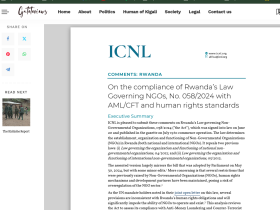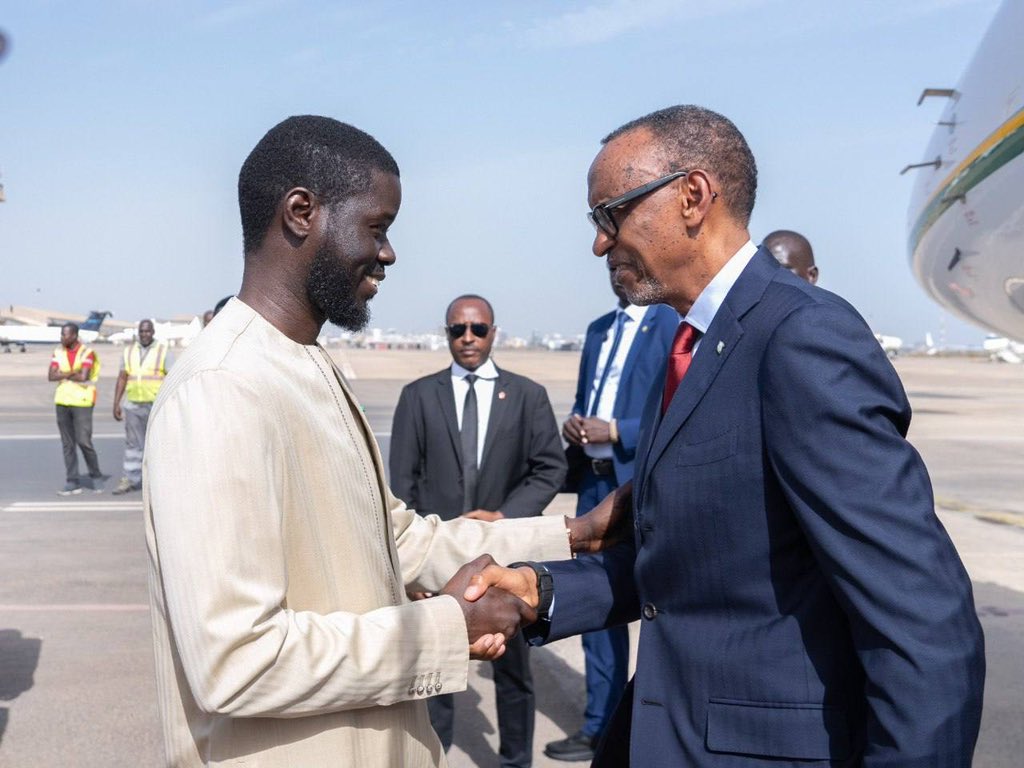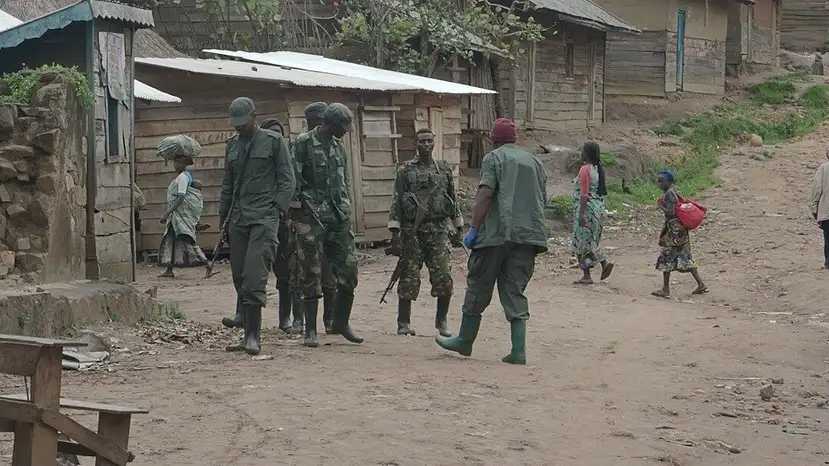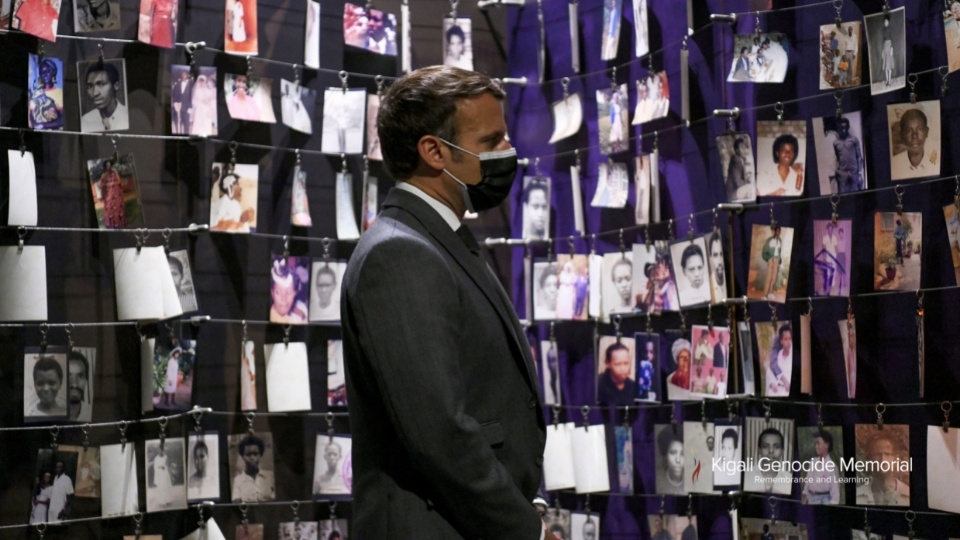By Dr. Richard R. Mugahe
- Rwanda is believed to be the most highly scrutinised country in the world. A brief search every morning on websites of various media outlets, blogs, and social media, you are shocked by the level at which the country is being written on or being discussed. The question is why is Rwanda which is always described as a “tiny country in East-central Africa”, without oil and minimal natural resources so much under laser-beam scrutiny? What is in Rwanda that is attracting such scrutiny? What are the objectives of this scrutiny that is not seen with other countries? Is it a positive scrutiny intended to move the country forward? Or Is it a negative scrutiny intended to pull the government to its knees? Who are behind this scrutiny? I will attempt to analyse this issue that has diverted the focus of various Human Rights organizations, the so-called experts, media houses and various individuals to this small country indeed.
- Rwanda and specifically President Kagame has received numerous accolades from various international and regional organisations and institutions in recognition of his various contributions and achievements in different fields including;- good governance, human rights, environment, health, education, accountability and transparency among many others. Unfortunately, they are the same group of individuals and some organisations who claim to be experts on Rwanda and the region, that have put all these achievements aside, and decided rather to give a completely opposite image of the country- a failed governance, human rights violation, lack of democracy, bellicose, repressive and many other negative adjectives and nouns you would think of.
Who are these people?
- Scanning through majority of these so-called experts on Rwanda who have and continue to lead this negative scrutiny campaign against Rwanda government, you discover some similarities amongst them. There are some who worked very closely with the previous regime that planned and carried out genocide. There are others who had written and predicted the trend for the post-genocide Rwanda, and were proved wrong. Others are outright genocide deniers and revisionists.
- Indeed the rest are vulture-like opportunists who always survive on chaos and conflicts. You find another group of mediocres who simply make wrong analysis of any situation. Again to some it’s simply “how can this small Rwanda particularly it’s President Kagame be recognised worldwide as success story and for exemplary leadership”.
- As usual these negative groups are more vocal and virulent than those who make objective assessment of Rwanda. Since theirs is a mission-oriented, they work day and night to achieve it. All these groups have linked up with the genociders and criminal renegades who are scattered in the region, Europe and the Americas and formed what appears like a “movement” or an “association” with the ultimate objective of bringing the current government of Rwanda to its knees.
- The motivation of the genociders and criminal renegades like Kayumba, Karegeya, Rudasingwa, Gahima and the likes need not be explained further than saying that the former are driven by the completion of their original mission – total extermination; while the later are driven by criminal, self-serving and opportunistic objectives. Their criticisms against the government are therefore not surprising.
- They are those that were very close to the genocide regime including fellows like Filip Reyntjens who was a senior advisor to the late President Habyarimana. He led a three-man team that wrote the 1978 Rwandan Constitution, which entrenched one party system and ethnic divisions; and gave absolute powers to the president. He worked for the genocide regime from 1976 to 1994 when genocide started. He was therefore part and parcel of the defeated genocide regime and is determined to defend it at any cost. Reyntjens is currently one of the leading critics of the current Rwandan Government always accusing it of also having committed genocide. He had told then President Habyarimana that RPF can never win the war. In his book, “Les Risqué du Metiers”, he says “I have proved that I never trusted RPF since the beginning of the civil war…”. He continues to say that, “I believe that genocide could not have happened without the war. And in this context, RPF is politically responsible for the genocide. Concerning the war crimes and crimes against humanity that have been committed by RPF, my position is very clear, RPF is responsible for the crimes be it before, during and after the civil war of April-July 1994”. This shows his inherent prejudice against the current Rwanda Government. All his predictions on RPF and advice to the genocide regime were futile. It’s therefore not surprising finding Reyntjens one of the leaders of the campaign to bring down the current Rwanda government.
- Rwanda under this new leadership has been proving wrong many other renowned “experts on Africa, the region and Rwanda”. The worst crime you can commit especially when you are assumed to be ‘uncivilised, ignorant and poor’ is to challenge the expert’s views. Many students have failed because of challenging their professors. When RPF was formed in 1987 and declared the intention of going back home through the use of force, many thought there were dreaming. In October 1990 when Rwanda Patriotic Army (RPA) crossed the border and officially declared war on then Rwanda government, the experts on Rwanda and on guerrilla warfare argued that it was impossible to win neither the conventional war nor the guerrilla warfare without the support of the majority of the population inside the country which RPF indeed lacked. These experts were proved wrong. Within four years RPF had taken over the government.
- Genocide was planned and executed with help of some western and local “experts” with the chief architecture Colonel Bagosora declaring apocalypse for the Tutsi. Yes over one million was killed in cold blood, but genocidors and their experts did not achieve their total objective. “You will rule over the hills and forests” declared the experts who advised the planned forceful exodus of the whole population to neighbouring countries. Within two years almost everybody was back in his home. Human Rights Organisations and other experts predicted that RPF/A government is going to carry out revenge killings on all the returnees. In one meeting held in Ngoma, former Kibungo with all the international NGOs chaired by the UNHCR, the head of UNHCR told them that, “… humanitarian aid workers with experience in the region are very concerned about the fate of these returning refugees”, noting that “we are evacuating refugees from the Congo to an area in Rwanda that the UN has declared a no-go [red security] zone”. They were proved wrong. It turned to be the most peaceful repatriation and resettlement ever.
- Experts predicted Rwanda to be a failed state. They were proved wrong. Rwanda is now one of the fastest growing economies in the world and one of the most friendly to do business in the world. They advised that Rwanda should be divided into Tutsi-land and Hutu-land because the two so-called ethnic groups would never live together after genocide. Today, Rwanda with unity and reconciliation over 90 percent is a world case-study on post-conflict unity and reconciliation.
- UN and other donors were spending over two million US dollars daily on refugee camps in Eastern DRC then Zaire. [With the quick Rwandan military’s operation into Goma to repatriate refugees into Rwanda] in one day there were no more refugees and there was no more two million dollars a day for the NGOs of all types. Rwanda Patriotic Army (RPA) had denied them employment without warning. This was a sacrilegious crime that Rwanda had committed which can never be forgiven. We recall that immediately after genocide, there were over three hundred NGOs of all sorts in Rwanda. Considering the size of the country, that was almost an average of one NGO per sector and that could be enough to turn Rwanda into Paradise within less than a year. This was not the case because majority of them were merely briefcase NGOs. The new Rwanda government decided to expel all those NGOs, which could not show what there were doing on the ground. The First Congo War therefore that dismantled the refugee camps and repatriated majority of refugees was a second “assault” by Rwanda government on the NGOs. The NGOs immediate question was, “This is Rwanda again following us even in Zaire?” And resolved, “Rwanda must pay back”. Rwanda has since become anathema to almost all international NGOs.
- Indeed, since then almost all the International NGOs and affiliated local NGOs in DRC have been in arms against Rwanda to-date. Through media propaganda they have managed to proselytise some individuals and NGOs and some institutions which had limited or no knowledge on Rwanda, particularly from the western world who are very prone to media; and lazy or self–acclaimed researchers who claim to be experts on Rwanda or the region when they have never stepped there. These are fed daily on distorted reports by these anti- Rwanda NGOs;
- Experts advised on mobilisation, training and arming hundreds of thousands of Interahamwe recruits to launch “Operation insecticide” aimed at taking over the country in one day and completing the mission of genocide. This was foiled by pre-emptive offensive by RPA in the First Congo war. Experts advised and planned the conduct of insurgency warfare. It was defeated within the shortest time ever.
- Human Rights groups led by Human Rights Watch declared that they had a silver bullet to bring down Rwanda government. They accused RPF of double genocide during the liberation war. They were told that cannot happen; “How can you stop genocide and commit genocide at the same time?” They were reminded RPF was led by a Hutu and both the political wing and the Military wing had a mixture of what they called Tutsi and Hutu.
- They still had reserve of a silver bullet. Human Rights Groups accused RDF of committing genocide in DRC against Hutu refugees in the DRC mapping Report. The report was found to be mere fabrications compiled by the same international NGO groups and their proselytes with their usual intentions of bringing the RPF government to its knees. It was widely discredited and shelved.
- They ran out of silver bullets but still retained the common copper bullets which they continued to use against Rwanda government. They accused the government of human right violation and lack of media freedom and political space. But look at the regular elections right from grass root level through district, parliamentary to presidential level; over 10 political parties; the decentralised governance now being taken from district to sector level; accountability and transparency highly acclaimed by donors and World Bank ratings; highest representation of women in parliament in the whole world; one laptop per child, MDGs completion; Human Development Index- like infant mortality rate, maternal mortality rate, life expectancy, vaccination coverage, health insurance scheme, universal primary and secondary education, among many others being the highest in Africa. All these are attributes of democracy and good governance that have been achieved by only a few countries. How do you achieve these without human rights and democracy? Media in Rwanda is now self-regulatory; country- wide broadband and Internet connection, so what media freedom is more than that?
- The Association of anti-Rwanda forces developed an idea of using the academia- university platform to convince the world how Rwanda is a pariah states. They came together to write a book titled, “Remaking Rwanda: State Building and Human Rights After Mass Violence”, published at Wisconsin University which is highly infested with genocide deniers and revisionists headed by Scott Straus a renown genocide denier and revisionist who was the editor of the book. They fail even to recognise genocide, but rather call it mass violence. An objective reader would immediately confirm their position of genocide denial. What is more interesting is that the small volume-book of less than 200 pages was written by 28 authors. This book by the association of anti- Rwanda forces has set a world record of being the smallest volume with the highest number of authors. It’s only the Bible and Encyclopaedia which have a higher number of authors but they have much bigger volumes.
- The authors themselves simply confirm their motive before reading the book. I will highlight just a few of them.
- Filip Reyntjens, the senior advisor to President Habyarimana from 1976-1994, and the author of the 1978 Rwandan Constitution that entrenched ethnic divisions and one party system. He is one of the renowned critics of the current Rwanda government;
- Calina Tertsakian, a long time staff of HRW, was expelled from Rwanda for using fogged documents. Like all HRW staff, she has been a long time critic of Rwanda government. In her contribution to the book, she criticises the state of prisons in Rwanda. Ironically, Rwanda prisons have been approved by the UN and are now home to Sierra Leone prisoners;
- Jason Stearns, who has built his name on anti-Rwanda government propaganda claiming to be an expert on Rwanda and DRC. A very well renowned genocide denier and revisionist, Jason Stearns has worked with various anti-Rwanda government NGOs like Heritiers de la Justice and Human Rights watch. His book “Dancing in the Glory of Monsters: The Collapse of the Congo and the Great War of Africa”, attracted heavy criticisms from various reviewers. He recently picked up the cudgel defending his comrade–in-arms in denying Rwandan genocide, one Steven Heges when he was unearthed as a strong genocide denier and fanatic ally of FDLR. Steven Heges was coordinator of UN Group of Experts who authored the Addendum report accusing Rwanda government of creating and supporting M23. This has put the last nail on the coffin of the so-called Group of experts Addendum which had already been proven to be fictitious and conspiratorial. It has also put to question the criteria on which the so-called experts are vetted by the UN. Jason Stearns runs the Blog, “congosiasa” whose only objective is to criticise Rwanda government and support the genociders.
- Timothy P. Longman. Just one statement in one of his writings can tell his position on the current Rwanda government right from the liberation war. “From 1990 to 1994, the Rwandan Patriotic Army (RPA), comprised most heavily of Ugandan soldiers led by Ugandan citizens like Paul Kagame, committed atrocity after atrocity as they forced their way to power in Kigali, always falsely accusing their enemies – the power – sharing government of then President Juvenal Habyarimana – of genocide”. A clear genocide denier and revisionist who argues that it is the RPF which committed genocide and not Habyarimana government. The list continues.
- Any one of the 28 authors is either closely linked with the old regime, a renegade or genocide denier and revisionist. These and their likes are the ones that have been at the forefront of the negative scrutiny campaign against Rwanda government and invested all their time and energy to feed the world on distorted facts and reality on Rwanda and the region claiming to be experts. It’s therefore not surprising that their book attracted the highest number of critics amongst the reviewers.
- The “Association of anti-Rwanda Forces” appeared to have withdrawn tactically but had maintained their RISTA (Reconnaissance, Intelligence, Surveillance and Target Acquisition) assets in place in case there is any opportunity to launch another offensive. A few months ago this opportunity presented itself. CNDP withdrew from the integration arrangement with DRC government. Soon the war began. This was the golden opportunity the association of anti-Rwanda forces had been waiting for. Their war slogan became, “Rwanda created M23 and is backstopping it with weapons, ammunitions, logistics, and reinforcing it with many battalions. Its therefore Rwandan third invasion of DRC not M23”.
- Interestingly, the UN Group of Experts had completed their preliminary report and ready to hand it in the Security Council. But the Group of experts was headed by a strong member of the “Association of Anti-Rwanda Forces”, one Steven Heges a renowned strong ally and advocate of the genocide militia group FDLR. After consultations with Human Rights Watch and other anti-Rwanda Forces, they agreed there has to be an Addendum report associating Rwanda with the creation and support of M23. This is the genesis of the Group of Experts Addendum.
Rwanda’s success story
- Rwanda’s success story has been one of the contributing factors to the negative scrutiny campaign. Majority of the international NGOs and so-called experts have invested the whole livelihood and survival in chaos and conflicts in the developing world particularly Africa. As described earlier, like vultures they are always “flying” over Africa checking where there are conflicts or where they can fuel them. A stable, peaceful and developing Africa simply means their loss of their livelihood. They will therefore never wish for a stable and peaceful Africa.
- Rwanda’s emergence from a failed state during genocide to Africa’s success story did not go down well with those NGOs and so-called experts who have pegged their livelihood on chaos and conflicts. As mentioned earlier, over 300 NGOs that were in Rwanda immediately after genocide, majority of them lost out because of a stable and peaceful Rwanda. They were a similar number of NGOs in Eastern DRC within the refugee camps when the First Congo War started and when majority of refugees were returned home, majority lost their work. For the last three years since the signing of the agreement between DRC government and CNDP in 2009 to recent break-up, Eastern DRC was relatively peaceful and the NGOs did not have the relevant theme to mobilise funds on. The break-up of the integration and formation of M23 was a great opportunity for them to fuel the conflict by dragging in Rwanda in order to make it appear regional conflict rather than a failure of the one party to fulfil the agreement. They have indeed succeeded in convincing the international community that M23 is a creation of and is supported by Rwanda. The negative campaign against Rwanda government therefore is aimed at watering down the success story, which would have a contagious effect on other African countries.
Will their campaign strategy succeed?
- For any campaign strategy to succeed, it must be premised on the right cause and right objective or end-state. Both the cause and the objective must be in the interest of the people, that is, should move people forward by improving their well-being. This is even so with military and political campaigns. The campaign waged by the anti-Rwanda government forces lacks these fundamental guiding principles. Both the cause and the objective are simply self-serving with an apocalyptic end-state. This is why their campaign can never succeed. Their fabrications and distortions are continually being exposed and the embarrassment caused could ultimately doom them and absolve Rwanda government. You can never premise your strategy on lies and selfish ends and expect to succeed. Above all, what has made Rwanda a success story since the stopping of genocide is still in-place. It’s the strong, visionary leadership that successfully led the four-year liberation war; stopped genocide and pulled the country from a failed state to the current success story. That is why their current euphoria within the anti-Rwanda forces is going to be short lived. As it’s well known, “Conspiracy rarely turns out to be as obvious as they appear; and certainly don’t have written archives”.
- In conclusion, since the current Rwanda government took power in 1994 after defeating the genocide regime, there has been deliberate concerted campaign to bring it down. Apart from the genociders, this conspiracy campaign has brought together the former allies of the genocide government, the genocide deniers and revisionists, various international NGOs and the so-called experts who have pegged their survival and livelihood on chaos and conflicts in Africa. Indeed Rwanda’s success story and the visionary leadership behind it poses an existential threat to these international NGOs and the so-called experts such that it has contributed significantly to the negative scrutiny campaign against Rwanda government.
- As well stated by the author of the Addendum report-Steven Heges; after the failure of their strategy of the use of force to remove the Rwanda government, their current strategy is to tarnish the image of the government and particularly the President till, “international opinion eventually sours on the Rwanda regime”. The conspirators are now in a state of euphoria believing their strategy is paying off, but the question is how long will this euphoria last and will they really achieve their objective of bringing the Rwanda government to its knees? As has been demonstrated earlier, the answer is NO. Any strategy based on lies, distortions, dishonesty, mediocrity and selfish interests can never succeed. They will therefore never achieve their objective of bringing the government to its knees. President Kagame gave the way forward is his speech after the swearing-in of the current Prime Minister Dr Pierre Damien Habumuremyi when he said, “We are the most scrutinised nation in the world but this should only give us more strength to serve our people even better. We should never be disheartened by what diversionary people say about us but rather work hard to disprove them”. This truism suits well in the current media frenzy on the on-going conflict in the Eastern DRC and the attempts to associate it with Rwanda government.
Posted 6th November 2013


















Leave a Reply